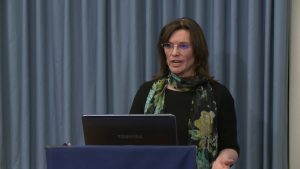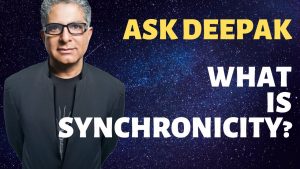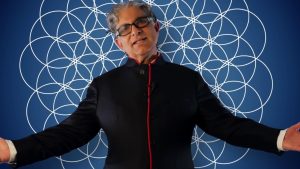Deepak explores the meaning and role of the ego in our consciousness. Is it good or bad? The ego is our self-image, not our true self. It is characterized by labels, masks, images, and judgments. The true self is the field of possibilities, creativity, intentions, and power. We can go beyond the ego through self-awareness – awareness of our thoughts, feelings, behaviors, and speech. Thus we begin to slowly move beyond the ego to the true self. Deepak reads a beautiful poem by Rabindranath Tagore, entitled “Who is this?” which describes the ego as “my own small self.” Can you go beyond your own small self, your ego, to discover your true self?
What Is Ego? Ask Deepak Chopra!
- Post published:May 9, 2020
- Post category:Manifestation
- Post comments:9 Comments

Tags: personal-growth-success




Respected sir, Thank you.
That poem is profound and helped me see what this ego is as it has been thrown around so much that it’s definition had become quite nebulous to me. Thank you !
train Music
🐟 10. EGO (THE “I” THOUGHT):
The Latin pronoun “EGO” is one of the most misused words in the English language, especially in spiritual circles, where it is used as a noun, although it is a poor translation of the Sanskrit “ahaṃkāra”, which is more accurately a verb.
“Ahaṃ” simply means “I/Ego”, and “ahaṃkāra” means “Creating the I/self” or “Activating the sense of self”.
As an aside, some Sanskrit scholars have noticed that the word “ahaṃ” is formed of a+ha+ṃ, a triad of Śiva (a), Śakti (ha) and bindu (ṃ). The whole Sanskrit alphabet is enclosed by those two syllables, just as the Greek tongue begins and ends with “alpha” and “omega”, respectively. “I am the Alpha and the Omega!”, said God in the book of Revelations. The palindrome of “ahaṃ” is “mahā”, meaning “GREAT”.
False egoity (ahaṃkāra) is an errant conception of oneself. In other words, it is the idea that “I am an independent agent, with the volition to freely think, feel and behave as I choose”, instead of simply an unqualified “I AM” (”ahaṃ”, in Sanskrit) or at the very least, “I am all-encompassing existence” (”ahaṃ brahmāsmi”, in Sanskrit).
The most accurate definition of “Ego/I” is: “the self, which is a conscious PERSON”. A human person is the Stainless Consciousness of Source acting through a particular body-mind complex (which in turn is an ever-morphing biological organism).
Therefore, whenever the word “ego” is heard in practically any spiritual/religious context, it is not to be taken literally (“I”) but in the sense of “ahaṃkāra” (an exaggerated sense of self-importance).
So, when the true self (which is Brahman, the TOTALITY of existence) misidentifies itself with the temporal body-mind, it is “false ego” (ahaṃkāra) but when the self/Self identifies with Conscious Awareness (Brahman), acting through the body-mind organism, it is the “real ego” (”ātmana/Paramātmana”, in Sanskrit).
Humans usually believe that they are the body-mind organism. Those who have awakened (or at least spiritually aware) consider themselves to NOT be their body-mind. One who is truly enlightened knows for certain that he is both a human being on the relative level, but quintessentially the very ground of being in the Absolute sense. When properly analysed, the phrase “I am Spirit” or “I am All” (”ahaṃ brahmāsmi”, in Sanskrit) means “I, the ego (the relative persona) am Nothing/Everything/All/Brahman/Tao/Spirit (the Absolute Ground of Being).
Finally, it could be argued, with some degree of merit, that since the English language already has a word for oneself (“I”), that we ought to keep using the ENGLISH dictionary definition of “ego” (as the false sense of oneself). However, because the great majority of advanced religionists and spiritual practitioners outside Bhārata (India) who speak of these concepts, base their language on Sanskrit and/or Pali, it is far more accurate to separate “ego” (ahaṃ) from “false egoity” (ahaṃkāra). The literal translation should be paramount, to avoid ambiguity.
“The first and foremost of all thoughts, the primeval thought in the mind of every man, is the thought ‘I’. It is only after the birth of this thought that any other thoughts can arise at all. It is only after the first personal pronoun, ‘I’, has arisen in the mind that the second personal pronoun, ‘you’, can make its appearance. If you could mentally follow the ‘I’ thread until it led you back to its source you would discover that, just as it is the first thought to appear, so it is the last to disappear. This is a matter which can be experienced.”
Venkataraman Iyer,
(AKA Śri Ramana Maharshi),
South Indian Sage.
“If we are not humble, if we arrogantly think we already know everything, and we think we are God (because the ego believes that it is God…) – that has to be humbled in order for us to realize that we really ARE God.
But what we are is God who forgot it was God, and then creates an ego that pretends it is God. And so the ego of the false pretence that it’s already God must be ‘popped’, so that the Real God emerges.”
Robert “Shunyamurti” Shubow,
Sat Yoga Institute, Costa Rica.
@Reverend Eslam Thank you very much for those definitions as they are important. I have perceived that Sanskrit as a language has far more depth & breadth than the English language.
train Music
To read the remaining twenty-nine chapters of “A Final Instruction Sheet for Humanity”, which are the most accurate spiritual precepts so far in human history, Email:
[email protected]
with the acronym “FISH” in the subject field.
🐟
“The gateway to knowing is IGNORANCE”. 🤓
🐟 10. EGO (THE “I” THOUGHT):
The Latin pronoun “EGO” is one of the most misused words in the English language, especially in spiritual circles, where it is used as a noun, although it is a poor translation of the Sanskrit “ahaṃkāra”, which is more accurately a verb.
“Ahaṃ” simply means “I/Ego”, and “ahaṃkāra” means “Creating the I/self” or “Activating the sense of self”.
As an aside, some Sanskrit scholars have noticed that the word “ahaṃ” is formed of a+ha+ṃ, a triad of Śiva (a), Śakti (ha) and bindu (ṃ). The whole Sanskrit alphabet is enclosed by those two syllables, just as the Greek tongue begins and ends with “alpha” and “omega”, respectively. “I am the Alpha and the Omega!”, said God in the book of Revelations. The palindrome of “ahaṃ” is “mahā”, meaning “GREAT”.
False egoity (ahaṃkāra) is an errant conception of oneself. In other words, it is the idea that “I am an independent agent, with the volition to freely think, feel and behave as I choose”, instead of simply an unqualified “I AM” (”ahaṃ”, in Sanskrit) or at the very least, “I am all-encompassing existence” (”ahaṃ brahmāsmi”, in Sanskrit).
The most accurate definition of “Ego/I” is: “the self, which is a conscious PERSON”. A human person is the Stainless Consciousness of Source acting through a particular body-mind complex (which in turn is an ever-morphing biological organism).
Therefore, whenever the word “ego” is heard in practically any spiritual/religious context, it is not to be taken literally (“I”) but in the sense of “ahaṃkāra” (an exaggerated sense of self-importance).
So, when the true self (which is Brahman, the TOTALITY of existence) misidentifies itself with the temporal body-mind, it is “false ego” (ahaṃkāra) but when the self/Self identifies with Conscious Awareness (Brahman), acting through the body-mind organism, it is the “real ego” (”ātmana/Paramātmana”, in Sanskrit).
Humans usually believe that they are the body-mind organism. Those who have awakened (or at least spiritually aware) consider themselves to NOT be their body-mind. One who is truly enlightened knows for certain that he is both a human being on the relative level, but quintessentially the very ground of being in the Absolute sense. When properly analysed, the phrase “I am Spirit” or “I am All” (”ahaṃ brahmāsmi”, in Sanskrit) means “I, the ego (the relative persona) am Nothing/Everything/All/Brahman/Tao/Spirit (the Absolute Ground of Being).
Finally, it could be argued, with some degree of merit, that since the English language already has a word for oneself (“I”), that we ought to keep using the ENGLISH dictionary definition of “ego” (as the false sense of oneself). However, because the great majority of advanced religionists and spiritual practitioners outside Bhārata (India) who speak of these concepts, base their language on Sanskrit and/or Pali, it is far more accurate to separate “ego” (ahaṃ) from “false egoity” (ahaṃkāra). The literal translation should be paramount, to avoid ambiguity.
“The first and foremost of all thoughts, the primeval thought in the mind of every man, is the thought ‘I’. It is only after the birth of this thought that any other thoughts can arise at all. It is only after the first personal pronoun, ‘I’, has arisen in the mind that the second personal pronoun, ‘you’, can make its appearance. If you could mentally follow the ‘I’ thread until it led you back to its source you would discover that, just as it is the first thought to appear, so it is the last to disappear. This is a matter which can be experienced.”
Venkataraman Iyer,
(AKA Śri Ramana Maharshi),
South Indian Sage.
“If we are not humble, if we arrogantly think we already know everything, and we think we are God (because the ego believes that it is God…) – that has to be humbled in order for us to realize that we really ARE God.
But what we are is God who forgot it was God, and then creates an ego that pretends it is God. And so the ego of the false pretence that it’s already God must be ‘popped’, so that the Real God emerges.”
Robert “Shunyamurti” Shubow,
Sat Yoga Institute, Costa Rica.
A man convinced against his will is of the same opinion still.
Very good, ´´ego = self-image´´ ´´field = non-local´´ ´´self-awareness´´ ´´ego to true self´´ ´´go beyond self-awareness´´ ´´field of creativity, field intentionality, the field of power, field of possibilities´´ ´´slow transformation´´ = have this be ok. ´´true self = field non-local =
Great explanation. Thanks Deepak